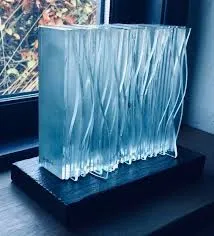Exploring the World of Pressed Glass Patterns
Pressed glass, a popular type of glassware created by pressing molten glass into molds, has captivated collectors and enthusiasts for decades with its intricate designs and historical significance. One of the most fascinating aspects of pressed glass is the wide array of patterns that adorn these beautiful pieces. These patterns not only enhance the aesthetic appeal of the glass but also tell a story of the time, technology, and artistry involved in its creation. This article delves into the fascinating world of pressed glass patterns, exploring their history, craftsmanship, and various styles.
Historical Background
Pressed glass originated in the 19th century, when advancements in manufacturing techniques allowed for faster and more cost-effective production. The technique gained popularity during the Victorian era, which valued ornate designs and the display of wealth through decorative arts. Glassmakers began to experiment with molds, creating unique patterns that could be mass-produced, making decorative glassware more accessible to the general public.
During this time, a number of companies emerged, each with its distinctive styles and signature patterns. Notable manufacturers such as Fenton, Westmoreland, and Indiana Glass became household names, contributing to a diverse range of pressed glass patterns that included floral motifs, geometric shapes, and intricate designs inspired by nature. As the production of pressed glass flourished, so did collectors’ enthusiasm for these pieces, leading to a vibrant market that continues to thrive today.
Craftsmanship of Pressed Glass
The process of creating pressed glass is a blend of art and science. Skilled artisans pour molten glass into a carefully crafted mold, where it is then pressed into shape using a plunger or other mechanisms. This method allows for an incredible level of detail in the patterning, often capturing delicate textures and intricate designs that would be difficult to achieve with traditional glassblowing techniques.
The molds themselves are often made from metal or wood, with many being designed to produce multiple pieces at once. This efficiency contributed to the popularity of pressed glass, allowing it to be sold at an affordable price point while still maintaining a high level of craftsmanship. The combination of artistic design and industrial production techniques made pressed glass a staple in homes across the world.
Popular Patterns
Pressed glass patterns can often be classified into several categories, showcasing the diversity of design that emerged during the height of its popularity
. Some of the most beloved patterns include
pressed glass patterns
1. Honeycomb Characterized by its hexagonal shapes and textured surfaces, the honeycomb pattern reflects a structural beauty reminiscent of natural beehives.
2. Fleur-de-lis This elaborate pattern incorporates stylized lily motifs, exuding elegance and a classic design that dates back to medieval heraldry.
3. Lattice A geometric arrangement resembling a woven pattern, lattice designs are known for their simplicity and versatility, often used in serving dishes and bowls.
4. Daisy and Button This charming pattern features alternating daisy flowers and button shapes, epitomizing the Victorian penchant for floral designs.
5. Sunburst Radiating from a central point, the sunburst pattern symbolizes energy and warmth, making it a popular choice for decorative plates and serving pieces.
6. Colonial Pattern Featuring motifs inspired by colonial American design, this pattern often includes elements such as stars and eagles, evoking a sense of nostalgia and patriotism.
Collecting Pressed Glass
For many, collecting pressed glass is not just a hobby, but a passion that encompasses history, design, and craftsmanship. Collectors often seek out specific patterns, manufacturers, or time periods, forming connections with fellow enthusiasts at antique fairs, online forums, and local clubs. Understanding the different patterns and their historical context enhances the joy of collecting, turning each piece into a conversation starter and a cherished memory.
In conclusion, pressed glass patterns are a testament to the creativity and skill of artisans throughout history. From the intricate designs that reflect the cultural norms of the past to the contemporary appreciation that keeps this art form alive today, pressed glass continues to enchant both collectors and casual admirers alike. The enduring legacy of pressed glass patterns is a reminder of the beauty that can emerge when art and industry collide.
 Afrikaans
Afrikaans  Albanian
Albanian  Amharic
Amharic  Arabic
Arabic  Armenian
Armenian  Azerbaijani
Azerbaijani  Basque
Basque  Belarusian
Belarusian  Bengali
Bengali  Bosnian
Bosnian  Bulgarian
Bulgarian  Catalan
Catalan  Cebuano
Cebuano  Corsican
Corsican  Croatian
Croatian  Czech
Czech  Danish
Danish  Dutch
Dutch  English
English  Esperanto
Esperanto  Estonian
Estonian  Finnish
Finnish  French
French  Frisian
Frisian  Galician
Galician  Georgian
Georgian  German
German  Greek
Greek  Gujarati
Gujarati  Haitian Creole
Haitian Creole  hausa
hausa  hawaiian
hawaiian  Hebrew
Hebrew  Hindi
Hindi  Miao
Miao  Hungarian
Hungarian  Icelandic
Icelandic  igbo
igbo  Indonesian
Indonesian  irish
irish  Italian
Italian  Japanese
Japanese  Javanese
Javanese  Kannada
Kannada  kazakh
kazakh  Khmer
Khmer  Rwandese
Rwandese  Korean
Korean  Kurdish
Kurdish  Kyrgyz
Kyrgyz  Lao
Lao  Latin
Latin  Latvian
Latvian  Lithuanian
Lithuanian  Luxembourgish
Luxembourgish  Macedonian
Macedonian  Malgashi
Malgashi  Malay
Malay  Malayalam
Malayalam  Maltese
Maltese  Maori
Maori  Marathi
Marathi  Mongolian
Mongolian  Myanmar
Myanmar  Nepali
Nepali  Norwegian
Norwegian  Norwegian
Norwegian  Occitan
Occitan  Pashto
Pashto  Persian
Persian  Polish
Polish  Portuguese
Portuguese  Punjabi
Punjabi  Romanian
Romanian  Russian
Russian  Samoan
Samoan  Scottish Gaelic
Scottish Gaelic  Serbian
Serbian  Sesotho
Sesotho  Shona
Shona  Sindhi
Sindhi  Sinhala
Sinhala  Slovak
Slovak  Slovenian
Slovenian  Somali
Somali  Spanish
Spanish  Sundanese
Sundanese  Swahili
Swahili  Swedish
Swedish  Tagalog
Tagalog  Tajik
Tajik  Tamil
Tamil  Tatar
Tatar  Telugu
Telugu  Thai
Thai  Turkish
Turkish  Turkmen
Turkmen  Ukrainian
Ukrainian  Urdu
Urdu  Uighur
Uighur  Uzbek
Uzbek  Vietnamese
Vietnamese  Welsh
Welsh  Bantu
Bantu  Yiddish
Yiddish  Yoruba
Yoruba  Zulu
Zulu 

